5 books about Melodrama in motion pictures
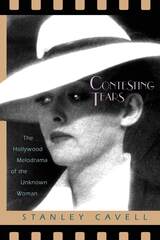
Contesting Tears
The Hollywood Melodrama of the Unknown Woman
Stanley Cavell
University of Chicago Press, 1996
What is marriage? Can a relationship dedicated to equality, friendship, and mutual education flower in an atmosphere of romance? What are the paths between loving another and knowing another? Stanley Cavell identified a genre of classic American films that engaged these questions in his study of comedies of remarriage, Pursuits of Happiness. With Contesting Tears, Cavell demonstrates that a contrasting genre, which he calls "the melodrama of the unknown woman," shares a surprising number and weave of concerns with those comedies.
Cavell provides close readings of four melodramas he finds definitive of the genre: Letter from an Unknown Woman, Gaslight, Now Voyager, and Stella Dallas. The women in these melodramas, like the women in the comedies, demand equality, shared education, and transfiguration, exemplifying for Cavell a moral perfectionism he identifies as Emersonian. But unlike the comedies, which portray a quest for a shared existence of expressiveness and joy, the melodramas trace instead the woman's recognition that in this quest she is isolated. Part of the melodrama concerns the various ways the men in the films (and the audiences of the films) interpret and desire to force the woman's consequent inaccessibility.
"Film is an interest of mine," Stanley Cavell has written, "or say a love, not separate from my interest in, or love of, philosophy." In Contesting Tears Cavell once again brilliantly unites his two loves, using detailed and perceptive musings on melodrama to reflect on philosophical problems of skepticism, psychoanalysis, and perfectionism. As he shows, the fascination and intelligence of such great stars as
Ingrid Bergman, Bette Davis, and Barbara Stanwyck illuminate, as they are illuminated by, the topics and events of these beloved and enduring films.
Cavell provides close readings of four melodramas he finds definitive of the genre: Letter from an Unknown Woman, Gaslight, Now Voyager, and Stella Dallas. The women in these melodramas, like the women in the comedies, demand equality, shared education, and transfiguration, exemplifying for Cavell a moral perfectionism he identifies as Emersonian. But unlike the comedies, which portray a quest for a shared existence of expressiveness and joy, the melodramas trace instead the woman's recognition that in this quest she is isolated. Part of the melodrama concerns the various ways the men in the films (and the audiences of the films) interpret and desire to force the woman's consequent inaccessibility.
"Film is an interest of mine," Stanley Cavell has written, "or say a love, not separate from my interest in, or love of, philosophy." In Contesting Tears Cavell once again brilliantly unites his two loves, using detailed and perceptive musings on melodrama to reflect on philosophical problems of skepticism, psychoanalysis, and perfectionism. As he shows, the fascination and intelligence of such great stars as
Ingrid Bergman, Bette Davis, and Barbara Stanwyck illuminate, as they are illuminated by, the topics and events of these beloved and enduring films.
[more]
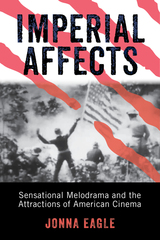
Imperial Affects
Sensational Melodrama and the Attractions of American Cinema
Eagle, Jonna
Rutgers University Press, 2017
Imperial Affects is the first sustained account of American action-based cinema as melodrama. From the earliest war films through the Hollywood Western and the late-century action cinema, imperialist violence and mobility have been produced as sites of both visceral pleasure and moral virtue. Suffering and omnipotence operate as twinned affects in this context, inviting identification with an American national subject constituted as both victimized and invincible—a powerful and persistent conjunction traced here across a century of cinema.
[more]
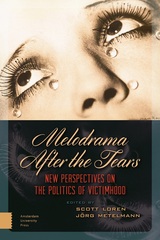
Melodrama After the Tears
New Perspectives on the Politics of Victimhood
Edited by Scott Loren and Jörg Metelmann
Amsterdam University Press, 2015
Melodrama, it is said, has expanded beyond the borders of genre and fiction to become a pervasive cultural mode. It encompasses distinct signifying practices and interpretive codes for meaning-making that help determine the parameters of identification and subject formation. From the public staging of personal suffering or the psychologization of the self in relation to consumer capitalism, to the emotionalization and sentimentalization of national politics, contributions to this volume address the following question: If melodramatic models of sense-making have become so culturally pervasive and emotionally persuasive, what is the political potential of melodramatic victimhood and where are its political limitations?This volume represents both a condensation and an expansion in the growing field of melodrama studies. It condenses elements of theory on melodrama by bringing into focus what it recognizes to be the locus for subjective identification within melodramatic narratives: the victim. On the other hand, it provides an expansion by going beyond the common methodology of primarily examining fictive works - be they from the stage, the screen or the written word - for their explicit or latent commentary on and connection to the historical contexts within which they are produced. Inspiration for the volume is rooted in a curiosity about melodramatic forms purported to increasingly characterize aspects of both the private and the social sphere in occidental and western-oriented societies.
[more]
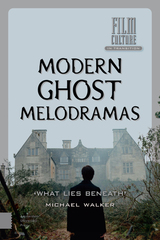
Modern Ghost Melodramas
'What Lies Beneath'
Michael Walker
Amsterdam University Press, 2017
The popular and critical successes of films like The Sixth Sense and the Ring film and its sequels in the late 1990s led to an impressive international explosion of scary films dealing with ghosts. This book takes a close look at a number of those films from different countries, including the United States, Japan, South Korea, Spain, and Great Britain. Making a crucial distinction between these atmospheric films and conventional horror, Michael Walker argues that they are most productively seen as ghost melodramas, which opens them up to a powerful range of analytic tools from the study of melodrama, including, crucially, psychoanalysis.
[more]
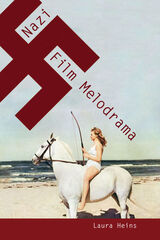
Nazi Film Melodrama
Laura Heins
University of Illinois Press, 2013
Cultural productions in the Third Reich often served explicit propaganda functions of legitimating racism and glorifying war and militarism. Likewise, the proliferation of domestic and romance films in Nazi Germany also represented an ideological stance. Rather than reinforcing traditional gender role divisions and the status quo of the nuclear family, these films were much more permissive about desire and sexuality than previously assumed. Focusing on German romance films, domestic melodramas, and home front films from 1933 to 1945, Nazi Film Melodrama shows how melodramatic elements in Nazi cinema functioned as part of a project to move affect, body, and desire beyond the confines of bourgeois culture and participate in a curious modernization of sexuality engineered to advance the imperialist goals of the Third Reich.
Offering a comparative analysis of Nazi productions with classical Hollywood films of the same era, Laura Heins argues that German fascist melodramas differed from their American counterparts in their negative views of domesticity and in their use of a more explicit antibourgeois rhetoric. Nazi melodramas, film writing, and popular media appealed to viewers by promoting liberation from conventional sexual morality and familial structures, presenting the Nazi state and the individual as dynamic and revolutionary. Some spectators objected to the eroticization and modernization of the public sphere under Nazism, however, pitting Joseph Goebbels' Ministry of Propaganda against more conservative film audiences in a war over the very status of domesticity and the shape of the family. Drawing on extensive archival research, this perceptive study highlights the seemingly contradictory aspects of gender representation and sexual morality in Nazi-era cinema.
[more]
READERS
Browse our collection.
PUBLISHERS
See BiblioVault's publisher services.
STUDENT SERVICES
Files for college accessibility offices.
UChicago Accessibility Resources
home | accessibility | search | about | contact us
BiblioVault ® 2001 - 2024
The University of Chicago Press









